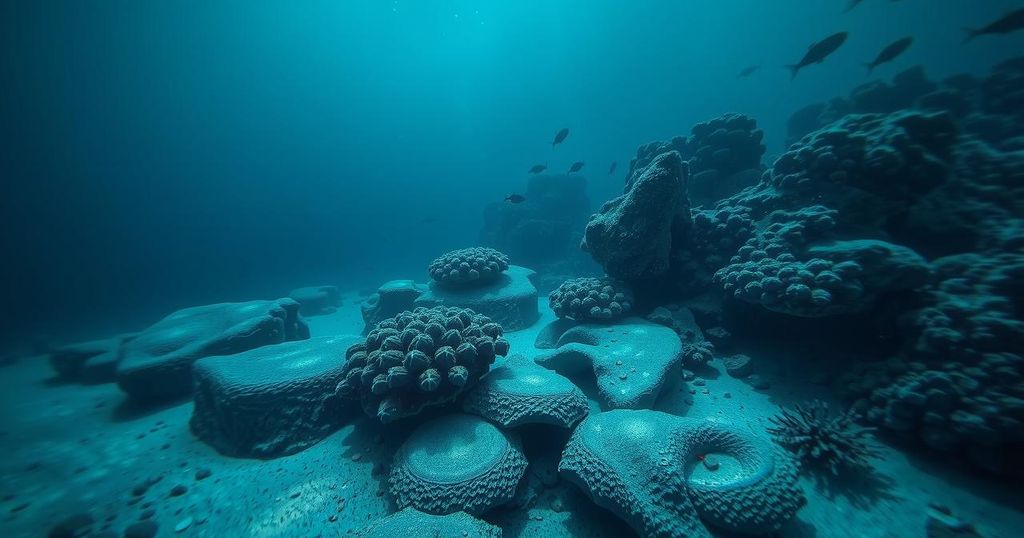Research shows climate change made marine heatwaves off Western Australia 100 times more likely, leading to the deaths of 30,000 fish. This ecological crisis results from prolonged overheating of ocean waters, primarily driven by human activities. The severe impact on marine ecosystems and local industries underscores the urgent need for addressing climate change.
Recent research indicates that the deaths of approximately 30,000 fish off the coast of Western Australia (WA) were significantly influenced by climate change, with marine heatwaves made up to 100 times more likely due to rising temperatures. Since September of the last year, prolonged heatwaves have impacted the waters off WA, notably reaching 1.5°C above average and at times peaking at 4-5°C hotter at the surface.
Climate Central’s analysis reveals that climate change has driven the occurrence of marine heatwaves: 20 times more likely overall and 100 times more likely for peak activity in November. These heatwave conditions, based on temperature anomalies sustained over five consecutive days, are a direct consequence of fossil fuel combustion, according to Dr. Andrew Pershing, Chief Program Officer of Climate Central.
Utilizing satellite data from reputable organizations such as the US National Oceanic and Atmospheric Administration, Climate Central’s Ocean Climate Shift Index employs 13 advanced climate models to isolate the impacts of human-induced carbon emissions. Nearly 90% of recorded marine heatwaves are attributed to anthropogenic global warming, and these phenomena are expected to increase in intensity and frequency as fossil fuel emissions escalate.
These marine heatwaves exert prolonged thermal stress on marine ecosystems, likely contributing to widespread fish kills, particularly noted along the Pilbara coast of WA. Dr. Pershing emphasizes that Australia is situated at the forefront of these climate-related challenges, which include detrimental impacts such as mass fish mortality and coral bleaching, adversely affecting fishing and tourism industries.
An earlier marine heatwave during 2010-2011 had already devastated over a third of the seagrass meadows in Shark Bay. Dr. Matt Rayson, an oceanographer at the University of Western Australia, noted that unusually high temperatures have been progressing down the coast, affecting the ocean’s surface and subsurface layers.
His studies corroborate that the ocean absorbs approximately 90% of the additional energy trapped by greenhouse gases, heightening the potential for ocean heatwaves. As ocean temperatures continue to rise, these changes may also provoke severe weather events, including tropical cyclones.
As of January, reports indicated ocean temperatures around WA were consistently at least 1.6°C higher than average, underscoring the ongoing nature of this marine heat anomaly. Dr. Pershing reiterated that marine heatwaves exhibit patterns directly linked to climate change, with heightened frequency and severity correlating with ongoing atmospheric pollution from human activities.
Fossil fuel consumption is critically affecting planetary systems, impacting land and marine environments. As Dr. Pershing observed, “Humans are affecting the planet in a lot of ways… and the ocean is such a huge part of our planet.”
The impact of climate change on marine ecosystems has been a growing concern among scientists, particularly regarding the increased frequency and severity of marine heatwaves. Such extreme events can cause devastating effects on aquatic wildlife, including mass deaths of fish and destruction of habitats. Recent studies have spotlighted regions like Western Australia, where overheating waters have led to significant ecological disturbances. As the planet continues to warm due to human activities, the risk of these impactful phenomena is projected to increase, emphasizing the urgent need for climate action.
In summary, research demonstrates that climate change has drastically heightened the likelihood of marine heatwaves, directly leading to the deaths of an estimated 30,000 fish along the WA coast. The unprecedented temperature increases in ocean waters are attributed primarily to human-induced fossil fuel emissions. This poses severe consequences not only for marine life but also for associated industries, highlighting the critical need for immediate climate-related interventions.
Original Source: www.theguardian.com




